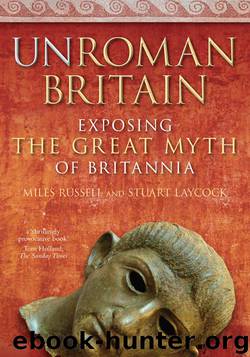UnRoman Britain by Miles Russell

Author:Miles Russell
Language: eng
Format: epub
ISBN: 9780752469294
Publisher: The History Press
Published: 2011-09-18T16:00:00+00:00
* * *
109Russell 2006, 181-93; McWhirr 1981.
110Palladius Lausiac History LXI.
6
BRITANNIA – REBEL EMPIRE
IT probably can’t be emphasised enough the extent to which Britain’s fate within the Empire was dictated by the timing of the occupation. There seems little doubt that eventually, if Rome had arrived earlier in Britain, Britain would have ended up being significantly less UnRoman, and perhaps even really Roman. However unenthusiastic about Rome the Britons were, if Rome had stayed permanently, they would presumably eventually have got used to the idea and been more completely assimilated.
By the time Rome invaded Britain in 43, northern Gaul had been under Roman rule for almost a century, and Roman Africa, plus parts of Spain and parts of southern Gaul, had already been under Roman rule for up to two centuries.
In addition, the mere date of the start of Romanisation was only the beginning of the story. The example of other provinces demonstrates that it could take a long, long time for a territory really to settle down under Roman control. There were still revolts in Gaul well into the first century AD. In 21, the revolt of Florus and Sacrovir affected almost every tribe, according to Tacitus, but particularly the Aedui, Sequani, Treveri, Andecavi and Turoni.111 While in 68 Vindex, a Roman governor in Gaul, but with an aristocratic Aquitanian background, rose against Nero. In 70, a revolt of the Batavians and Frisians under one Claudius Civilis led to a wider rebellion against Rome in Gaul, featuring the tribes of the Treveri, Lingones and Nervii. With many of the rebels thinking that the civil wars and chaos of the era after Nero’s death meant that the Roman Empire was coming to an end, the idea of creating a separate Gallic Empire (Imperium Galliarum) was even raised, but past tribal grudges prevented it and eventually ensured the collapse of the rebellion.112
In a society with significant levels of illiteracy, it may be worth taking into account the time span over which accurate, oral memories of complex historical events can survive among families. Research suggests that the period in question is up to two centuries.113 A recent real example of this is a person who told how his father told him that his grandmother told him that when she was young, a person came to her house and shouted up the stairs about the capture of Napoleon, ‘They’ve ta’en Boney’.114 Obviously, in a time when lifespans were shorter, there would have been fewer people passing on oral memories of long ago, but there were still people who lived to very old ages (one Claudia Crysis from Lincoln, for instance, is recorded as having lived to the age of 90, while in Caerleon, Julius Valens lived to the age of 100, while his wife lived to the age of 75). Moreover, in a society before television, such things would have been talked about more frequently, and their effect would also have been strengthened by longer-lasting and more formal means of conveying oral memories, such as epic oral poetry telling of the deeds of tribal heroes.
Download
This site does not store any files on its server. We only index and link to content provided by other sites. Please contact the content providers to delete copyright contents if any and email us, we'll remove relevant links or contents immediately.
| General | Channel Islands |
| England | Northern Ireland |
| Scotland | Wales |
Room 212 by Kate Stewart(5121)
The Crown by Robert Lacey(4817)
Endurance: Shackleton's Incredible Voyage by Alfred Lansing(4783)
The Iron Duke by The Iron Duke(4356)
The Rape of Nanking by Iris Chang(4213)
Joan of Arc by Mary Gordon(4110)
Killing England by Bill O'Reilly(4001)
Say Nothing by Patrick Radden Keefe(3985)
I'll Give You the Sun by Jandy Nelson(3447)
Shadow of Night by Deborah Harkness(3368)
Hitler's Monsters by Eric Kurlander(3343)
Mary, Queen of Scots, and the Murder of Lord Darnley by Alison Weir(3210)
Blood and Sand by Alex Von Tunzelmann(3205)
Eleanor & Park by Rainbow Rowell(3173)
Darkest Hour by Anthony McCarten(3133)
Margaret Thatcher: The Autobiography by Thatcher Margaret(3082)
Book of Life by Deborah Harkness(2939)
Red Famine: Stalin's War on Ukraine by Anne Applebaum(2934)
The One Memory of Flora Banks by Emily Barr(2863)
